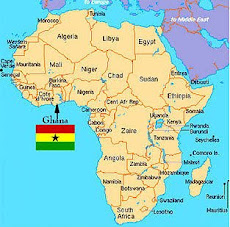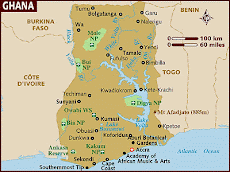Unfortunately, the sound system was so poor, that when the young women told us their “philosophy of life”, we couldn’t hear what they were saying. We have to admit to leaving before the end and walking back to our house through the African night, in the company of vivid stars, the sound of crickets and the scavenging goats. Not a single vehicle passed us once we were off the main street. Our house is about 35 minutes from the centre of town, at a brisk walk.
There is a market in Wa on every day of the week, with local farmers bringing their produce to sell. There is a huge market every 6 days, with clothing, material, utensils and shoes, as well as food stuffs. We have noticed that the stalls all seem to stock similar produce. In our first week, there were pineapples everywhere. This week there were none. Suddenly a lorry load of ap
 ples
plesfrom South Africa appeared this week and it was possible to buy apples everywhere for a short time. Oranges and bananas have been consistently available. On the vegetable front, cabbages and carrots can usually be found. Yam, plantain, okra, tomatoes, onions, garlic, green peppers and chilli peppers always seem to be about. We are only just beginning to understand the pricing. Last year Ghana revised its currency. The new Ghana cedi (GhC) is worth 10,000 of the previous cedis. For example, market stall holders are still asking for 5,000 cedis, when we actually have to pay half a new Ghana cedi.

The shops in town are stocked with what comes in from Accra on lorries. We had difficulty tracking down a toaster, but there were many liquidisers available, due to a recent delivery. Most of the electrical goods are very cheap and from China. In buying a kettle we had to choose between a Chinese one at 15 GHCs (£6/7) and a Japanese one at 50GHC. (£22.00) – both way beyond the reach of local people. We went for the Chinese version, couldn’t make it work and returned it to the shop. We’ll probably get a kettle that heats up on our gas ring. We did celebrate last Saturday when we found a new toilet seat. At the equivalent of £3 we do not have high expectations of its future long service.
The taxis are another amazing feature. Virtually every car has a cracked wi
 ndscreen. They are all battered and bruised. No electric windows here. A few do have a window winder that still works. Many of the vehicles are Japanese, although there are a good number of European Peugots, VWs etc. As for the NGO, aid-sponsored vehicles, they tend to be 4- wheel drive, new vehicles; many are pick-ups. The local people use mini-buses called tro-tros. They are old, battered, overcrowded and travel far too fast for the road conditions. We will do all we can to avoid using them. Coaches travel between the main cities, like the one we used to travel from Accra to Wa. This was a well maintained vehicle with air-conditioning and a professional driver, albeit overloaded with people and luggage. The picture shows our friend. Amino, who has started up his own taxi business.
ndscreen. They are all battered and bruised. No electric windows here. A few do have a window winder that still works. Many of the vehicles are Japanese, although there are a good number of European Peugots, VWs etc. As for the NGO, aid-sponsored vehicles, they tend to be 4- wheel drive, new vehicles; many are pick-ups. The local people use mini-buses called tro-tros. They are old, battered, overcrowded and travel far too fast for the road conditions. We will do all we can to avoid using them. Coaches travel between the main cities, like the one we used to travel from Accra to Wa. This was a well maintained vehicle with air-conditioning and a professional driver, albeit overloaded with people and luggage. The picture shows our friend. Amino, who has started up his own taxi business.In Wa, there is one set of signposts at the main roundabout in the town. No streets are named and no houses or public buildings have addresses. Everyone uses P.O. box numbers. There is no map available to find out where to go. We have to rely totally on asking local people. For example, the road where the school for the deaf is located is known by everyone locally as the “deaf road”. When Linda was getting directions to a particular primary school this week, she was told by a senior education officer to go to the roundabout, keep the police station on her right and continue straight on until coming to a baobab tree on the left. It all seems to work, although it takes some getting used to, when we have been so map and address orientated for so long.
We have spent much of this week visiting local schools with the “circuit supervisors”. This has been really enlightening. The most shocking sight was a kindergarten class of 115 children, crowded into a small, baking hot building, with flies everywhere. It would be very easy to become completely overwhelmed by the sheer scale of what needs to be done, but we are gradually finding small ways in which we can support people.


